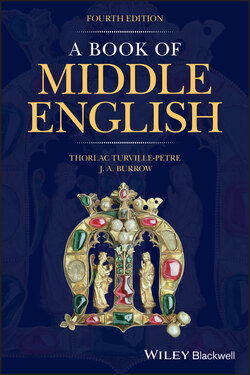Читать книгу A Book of Middle English - J. A. Burrow - Страница 106
Commentary
ОглавлениеThe stanza is constructed as three four‐line sentences: in the first the Maiden states her opposition to the Dreamer’s statement, in the second she explains her objection, which leads to her condemnation of the Dreamer in the third. This logical structure is signalled by the conjunctions Bot if, For, And, ‘And yet’. Sentences are divided syntactically into two‐line clauses, as in lines 265–6 (subordinate clause), 267–8 (main clause). The vocabulary is relatively idiomatic, the alliteration more restrained than elsewhere in the poem, so that rhetorical devices such as the alliterating anthesis ‘flowred and fayled’, and the rhyme ‘oʒt of noʒt’, stand out by contrast. The poet plays on the word kynde, using it in different senses: firstly (270) as Nature that controls the life and death of all creatures; in the next line as the inherent nature or property of an object; in the final line as an adjective qualifying the jeweller, with a sense broader than the modern ‘kind’. Though including ‘generous, good natured’, its basic meaning is ‘having the good qualities expected’, in this case expected of a jueler gente, as the Maiden has addressed him. MED gent adj. offers a range of meanings, beginning with ‘of noble birth’, hence ‘of noble character’, and a broader range for the related adjective gentil, also used of the Dreamer in this part of the poem. He is both an ungracious and unnatural jeweller, for refusing the gift of a pearl and for blaming his wyrde for his supposed loss. When the Dreamer had used wyrde in l. 249, he was complaining about the concept of fate or destiny operating in random fashion. The Maiden picks him up on this; destiny is in the control of God who has created something from nothing, alluding to the doctrine of ‘creatio ex nihilo’. The Dreamer has lost a rose; this looks back to the flowery mound in the garden at the start of the poem. He has gained a pearl ‘of prys’; this looks forward to the reference to the biblical ‘pearl of great price’ which the Dreamer, like the merchant of the parable, is urged to purchase (733–44). He calls himself a jeweller; if so, the Maiden implies, he should sort out his priorities. His Pearl is enclosed in a kyste, a jewel‐chest; in the previous stanza she had called it a cofer and a forser, and defined it as the garden of paradise.
The issues raised by verse translation were considered by John Lydgate, whose poetic career was built on satisfying his patrons’ demands for English versions of Latin and French classics. Where a word‐for‐word translation is impossible, says Lydgate, he follows the substance of the original, but he admits the result is never wholly satisfactory. He ends his version of the French Dance Macabre (ed. Megan L. Cook and Elizaveta Strakhov (Kalamazoo, MI, 2019)) with this apology:
Out of the Frensshe I drewe it of entente,
Not worde by worde but folwyng the substaunce,
And fro Paris to Engelonde it sente
Oonly of purpos yow to do plesaunce.
Rude of langage (I was not born in Fraunce),
Have me excusid; my name is John Lidgate.
Of her tunge I have no suffisaunce
Her corious metris in Englisshe to translate.
